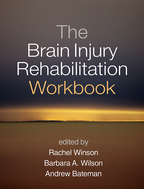The Brain Injury Rehabilitation Workbook
Edited by Rachel Winson, Barbara A. Wilson, and Andrew Bateman
A Paperback Originale-bookprint + e-book
A Paperback Original
orderJanuary 13, 2017
ISBN 9781462528509
Price: $54.00282 Pages
Size: 8" x 10½"
The reproducible materials can be downloaded and printed in PDF format.
“This gem of a workbook will be valuable to any professional interested in methods to maximize recovery and adjustment following acquired brain injury. The workbook is grounded in established theory and rehabilitation principles and is comprehensive in addressing the diversity of cognitive and psychological issues that commonly occur with brain injury. The content is well integrated and accessible to readers with varying levels of rehabilitation experience. Notable strengths of the book are the inclusion of chapters on mood and fatigue and the wealth of specific treatment activities—including handouts—that practitioners can easily implement and tailor to individual clients.”

—McKay Moore Sohlberg, PhD, CCC-SLP, Communication Disorders and Sciences Program, University of Oregon
“A highly readable book that will engage the interests of a wide range of rehabilitation professionals. Each chapter thoughtfully echoes an underlying emphasis on holistic care, resulting in a unique contribution to the rehabilitation literature. Presented in the context of foundational scientific evidence, and integrating specific clinical guidance with worksheets and case illustrations, this book is immediately applicable to clinical care. It will be a go-to resource for rehabilitation clinicians.”

—Jennifer J. Vasterling, PhD, Chief of Psychology, VA Boston Healthcare System; Professor of Psychiatry, Boston University School of Medicine
“These pioneers and master practitioners of brain injury rehabilitation have produced an incredibly beneficial and practical workbook that will allow highly effective approaches to rehabilitation to become widely available across the globe. The science is excellent, the clinical practice state of the art, and the humane whole-person approach worthy of great admiration. There is nothing else like this—if you work with even one brain-injured person, you have to have this workbook.”

—Ian H. Robertson, PhD, Global Brain Health Institute, Trinity College Dublin, Ireland
“It is refreshing to find a book that addresses both theoretical and practical aspects of cognitive rehabilitation, including practical examples of the critical role that cognitive deficits play in everyday life. Particularly useful tools and strategies for compensating for deficits associated with specific brain functions are reinforced throughout the book. This is an excellent resource for everyone from students to seasoned therapists looking to expand their skills. It is especially pleasing that the book discusses vitally important factors—such as mood, identity, and fatigue—that are often overlooked in the rehabilitation process.”

—Susan K. Kime, OTR/L, occupational therapist in private practice, Phoenix, Arizona
—McKay Moore Sohlberg, PhD, CCC-SLP, Communication Disorders and Sciences Program, University of Oregon
“A highly readable book that will engage the interests of a wide range of rehabilitation professionals. Each chapter thoughtfully echoes an underlying emphasis on holistic care, resulting in a unique contribution to the rehabilitation literature. Presented in the context of foundational scientific evidence, and integrating specific clinical guidance with worksheets and case illustrations, this book is immediately applicable to clinical care. It will be a go-to resource for rehabilitation clinicians.”
—Jennifer J. Vasterling, PhD, Chief of Psychology, VA Boston Healthcare System; Professor of Psychiatry, Boston University School of Medicine
“These pioneers and master practitioners of brain injury rehabilitation have produced an incredibly beneficial and practical workbook that will allow highly effective approaches to rehabilitation to become widely available across the globe. The science is excellent, the clinical practice state of the art, and the humane whole-person approach worthy of great admiration. There is nothing else like this—if you work with even one brain-injured person, you have to have this workbook.”
—Ian H. Robertson, PhD, Global Brain Health Institute, Trinity College Dublin, Ireland
“It is refreshing to find a book that addresses both theoretical and practical aspects of cognitive rehabilitation, including practical examples of the critical role that cognitive deficits play in everyday life. Particularly useful tools and strategies for compensating for deficits associated with specific brain functions are reinforced throughout the book. This is an excellent resource for everyone from students to seasoned therapists looking to expand their skills. It is especially pleasing that the book discusses vitally important factors—such as mood, identity, and fatigue—that are often overlooked in the rehabilitation process.”
—Susan K. Kime, OTR/L, occupational therapist in private practice, Phoenix, Arizona



